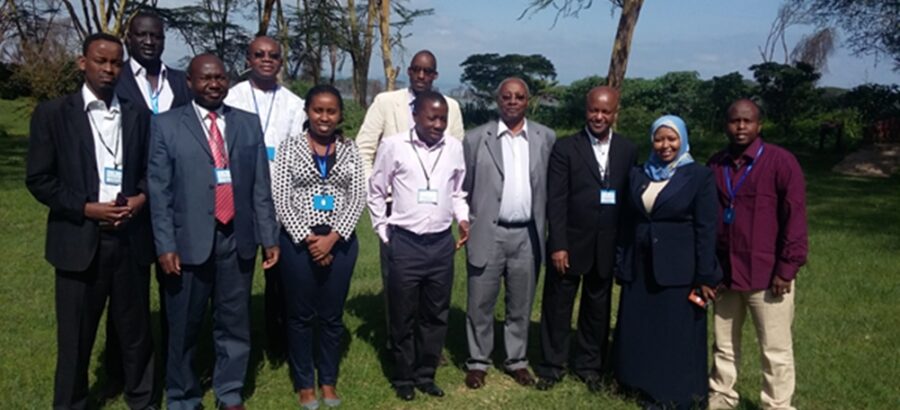FINAL COMMUNIQUE
- Introduction
In recognition of the challenges in data collection and the gap between different and often conflicting data sources, ICPALD has adopted the Animal Resources Information System (ARIS2), developed by the African Union – InterAfrican Bureau for Animal Resources (AU-IBAR), as a tool for enhancing the capacities of IGAD and its Member States to collect, collate, analyze animal resources data and share livestock information in a timely manner. In line with the aforementioned, ICPALD organized a technical back-stopping workshop for ARIS II Administrators from the region under the auspices of the Standard Methods and Procedures in Animal Health Project at Naivasha, Kenya from 9th to 10th June 2015. Its main objective was to get updates on the status of ARIS II functioning and operations in respective countries to facilitate technical back-stopping. A total of 13 participants drawn from Djibouti, Kenya, Somalia, South Sudan, Sudan, Uganda AU-IBAR and IGAD attended the workshop.
In his welcome remarks, Dr Solomon Munyua, Acting Director of the IGAD Centre for Pastoral Areas and Livestock Development (ICPALD) welcomed Member States (MS) to the workshop. He recognized the importance of data management performed by the ARIS II Country Administrators especially in informing planning for animal exports and animal breeding. He noted that Member States needed to embrace management of animal resources data with seriousness to help them determine investments for national Governments. He expressed his concern about the low status of reporting in MS that is affecting the planning process for Governments that normally depends on accurate information. He appealed to MS to collect data and submit it in a timely manner.
In his opening remarks, on behalf of the Director of African Union Interafrican Bureau for Animal Resources – Prof. Ahmed Elsawalhy, Dr Joseph Magona recognized the continued partnerships between AU-IBAR and IGAD/ICPALD and MS regarding development of animal resources in the region. He reiterated the fact that agriculture in general and livestock in particular are amongst the most important drivers of the economies of the IGAD Member States, and employ a large proportion of their population. He emphasized that development of these sectors requires qualitative, complete and timely data and information to support monitoring, planning and decision making. He stated that the ARIS technical back-stopping workshop was intended to provide Member States with technical corrective service regarding animal health data collection, collation and analysis in preparation for sharing. He hoped that Member States would embrace utilization of ARIS at various levels to promote effective management of livestock data.
In his official opening, on behalf of the Director Veterinary Services of Kenya, Dr Samuel Kahariri welcomed everybody to Kenya. He pointed out the importance of animal disease reporting as a way of accessing international markets. He wished members an interactive session and declared the workshop officially opened.
The meeting achieved the following outcomes:
- Status of ARIS II functioning and operations in respective countries established
- Status of animal health data collection networks within countries and their challenges established
- A mechanism by which countries can directly send data to ICPALD established
- A network for ARIS practitioners under the umbrella of ICPALD initiated
- Modalities for livestock information sharing between ICPALD and Countries discussed
- Proceedings
The meeting was organized on the basis of presentations, plenary discussions and group work.
2.1 Overview presentation on SMPAH support to the implementation of ARIS II within the IGAD region
The presentation highlighted the importance of the animal resources data and information, functions of ARIS and the SMPAH project support to the IGAD region in general. Major features of ARIS II were elaborated, including its customization for the IGAD region, multiple applications, modular approach, scope addressed, and major livestock domains covered. The presentation further elaborated benefits of ARIS, challenges in general and challenges of its usage by ICPALD and finally the way forward.
2.2 Mapping of trade-sensitive Disease in the IGAD region
The presentation highlighted mapping initiatives for diseases within IGAD countries using data collected and submitted through ARIS for 2013 and 2014 including challenges and gaps experienced.
2.3 Mapping livestock market and trade routes within the IGAD region
The presentation highlighted mapping initiatives for livestock markets and trade routes within the IGAD region.
2.4 Country reports
Country presentation covered status of ARIS II, reporting networks, challenges and way forward.
- Recommendations
Following lengthy deliberations by the participants and thorough group discussions, the following recommendations were made:
To AU-IBAR
- To simplify the ARIS system to make it user-friendly and interoperable with other systems especially information systems used by Member States
- To develop a feedback and alerting mechanism within the ARIS system or through an in-built e-mail system or by telephone call by an identified a contact person to alert Country Administrators validate the data once is received and uploaded.
- To improve ARIS system to allow for sequential and self-verifying data entry to avoid time-consuming data entry and uploading
- To expedite development of the long overdue new ARIS system and harmonise it with other animal disease reporting systems such as OIE-WAHIS
- To organize a meeting for Country ARIS II Administrators to verify before the new version of ARIS is released
- To conduct Refresher trainings regularly to update the Country Administrators on ARIS II especially focussing on other areas such as animal production, marketing and trade, fisheries and aquaculture, capacity and plant health
- To encourage data submission using excel spreadsheets for Member States with no or poor internet connectivity
To ICPALD
- To ensure any product developed using ARIS data is first validated by respective countries for their input and action for data sharing.
- To bring Ethiopia on board regarding livestock information sharing within IGAD region given its very critical and strategic location within the IGAD
- To encourage MS to re-centralised animal disease control given that decentralisation or devolution has affected disease reporting and delivery of veterinary services in several MS
To AU-IBAR and ICPALD
- To develop a data sharing policy to facilitate livestock data sharing among countries within the IGAD region
- To provide more technical and financial support to animal disease reporting within MS in IGAD region
To MS
- To send livestock data directly to ICPALD via ARIS and Excel Spreadsheets
- To undertake community awareness initiatives at national level to address the issue of data dissemination within the country.
- To encourage livestock data sharing among relevant line ministries and line departments
- To develop an incentive system within countries in order to improve efficiency and reliability of livestock data collection and submission via ARIS.
- To link national livestock data managers to animal health personnel at lower administrative levels despite devolution or decentralization of Governments.
- To address the problem of high levels of staff attrition through various management options including having an Assistant Country Administrator who is technically to the same level as the Country Administrator)
4.0 WAY FORWARD
- Country ARIS Administrators to commence sending of livestock data, including disease, animal production, fisheries and trade data to ICPALD by June 2015.
- AU-IBAR to immediately put in place the feedback mechanism for ARIS II Administrators by July 2015.
- ICPALD to kick-start implementation of the Networking for the Country ARISII Administrators within IGAD region by August 2015
Done this 10th Day of June 2015





